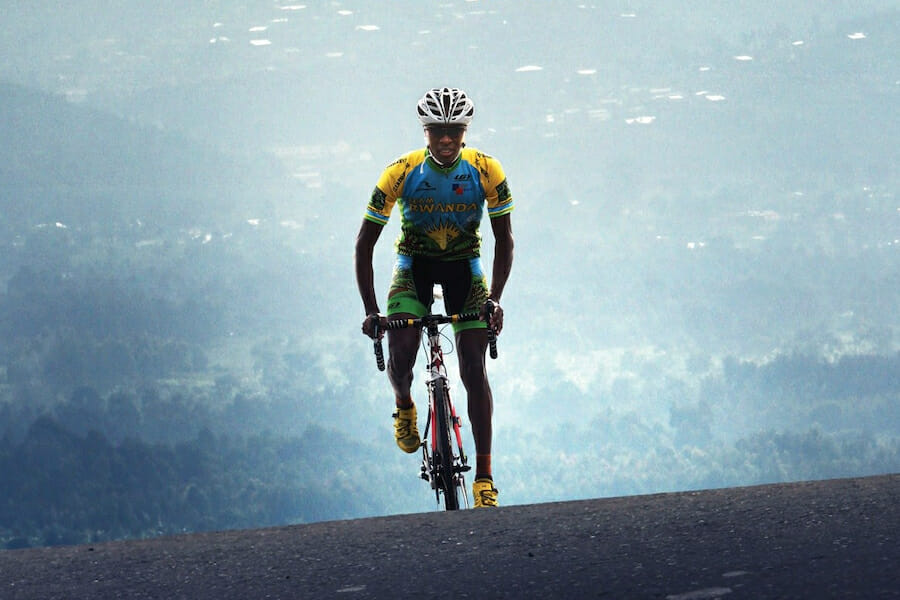
‘Rising from Ashes,’ the Rwandan Genocide and Conflict Resolution through Sports
It has been twenty years since the genocide that devastated Rwanda. Over 800,000 people lost their lives—for no other reason than belonging to the wrong tribe. The slaughter by the Hutus of the minority Tutsis took place in 1994. The Clinton administration stood by not wanting to admit that genocide was taking place. It was one of our darkest chapters in history. National Security Advisor Susan Rice, special assistant to President Bill Clinton on African affairs at the time, advised him not to become involved. It was a political decision not to call the slaughter of ethnic Rwandans genocide. “If we use the word ‘genocide’ and are seen as doing nothing, what will be the effect on the November election,” Rice had stated.
Rising from Ashes is an internationally acclaimed documentary, about hope for the future, for a generation of young men who went through the Rwandan genocide–survived and overcame adversity—but lost fathers, mothers, brothers, sisters, grandparents, cousins, and other family members. The conflict was about hatred, killing neighbors and friends, and destroying entire communities. The documentary tells the story about the first Rwandan National Cycling Team– composed of both Hutu and Tutsi riders–making history representing Rwanda internationally, and qualifying for the London 2012 Olympics.
Twenty years after the genocide, Rwanda is still struggling to overcome this scarring episode.
The small mountainous country, rich in coffee bean production, is trying to get back on its feet. Lacking good infrastructure and transportation systems much of the agricultural production is carried on bicycles. This is also the main way that people get around. Youngsters are lucky if they are able to find outmoded bicycles for their own use. Others have built wooden bikes with a single gear and even raced them against each other for fun.
As the racing movement progressed bicycles were put together from available components, and riders with the same interest were reunited, regardless of their tribal affiliation. The object was to compete in races and do the best they could. A number would eventually become members of the first national cycling team in 2007—all youngsters that had survived the Rwandan genocide.
After the 1994 genocide Tom Ritchey, the legendary mountain bike builder, supplied bicycles to Rwandan coffee bean farmers. Ritchey toured “The Land of a Thousand Hills” in 2005, and met several young cyclists calling themselves Team Rwanda–who had imported racing bikes to resurrect the sport. Ritchey believed there was the potential for developing a national cycling team. He turned to T.C. Johnstone a renowned filmmaker, Dan Cooper, and Peb Jackson’s future founders, all traveling with Ritchey, and explored the potential of making a film chronicling the Rwandan racing team’s development—thus began the seven-year journey.
Ritchey reached out to his friend Jock Boyer, a racing contemporary and first American cyclist to ride in the Tour de France, to help train and build a competitive racing team. The challenge would turn into a closeness between Boyer, and the Rwandan riders striving to achieve racing excellence, and acceptance by the international racing community.
Boyer staged his first race in 2006 where Adrien Niyonshuti led the pack. He was tall, lean, strong, coordinated, and tenacious. Adrien had an amazing outlook on life, even though he had lost sixty family members in the genocide. Boyer believed that a competitive team with Adrien and some of the other riders was possible.
Ritchey helped to provide the bikes, and other suppliers donated badly needed equipment. Boyer selected fifteen riders that had shown great promise. After months of training on the grueling Rwandan mountainous roads and trails, five riders were selected for the initial national team. Each exemplified a unique talent—a desire to win—had incredible strength, agility, strong mindset, tenacity, and personalities that would get along well during the torturous training. All had the same goal of representing Rwanda and winning. Boyer turned these eager amateur riders into a professional racing team—competing in both road and off-road races throughout Africa, eventually going to the United States and Europe.
In meeting T.C. Johnstone the film’s director, we connected immediately since I had visited Rwanda several years earlier. We talked about our mutual interests in Africa—concerns about poverty, education, and the way forward. In talking about the documentary he said: “it was not just about the bike, but about second chances.” He was intrigued by the story of a generation of youngsters devastated by genocide, what they went through–and could accomplish by reuniting the country.
At the screening on Friday, February 7 at the Adobe Center in Lehi, Utah, I welled-up seeing Adrien, the first black African to compete in the mountain bike event, at the London 2012 Olympics finishing in 39th place. I also had a chance to talk with two of the team present, Abraham Ruhumuriza, and Obed Ruvogera. They were shy and said it was not only about their success as riders, but they wanted people to know “that Rwanda is a good place.”
Rwanda’s racing success gave Nicodem Habiyambere, another incredible rider, the opportunity to join the International Cycling Union (UCI) team in South Africa. Adrien, who continues to race, opened a cycling academy for talented school children. Each receives a bicycle but must attend school, putting an emphasis on education. His program includes training the students to race.
With the success of the Rwandan racing program, Boyer and Ritchey are planning to expand the program to other parts of Africa–to unite people and overcome ethnic and cultural differences. Their plans for Ethiopia and Eritrea will be a good start since both countries have seen conflict for years, and a long-standing border dispute. The agenda will be to train riders from both countries to compete in the Rio 2016 Olympics.
The Rising from Ashes Foundation hopes to inspire and educate audiences around the world, to raise awareness of how cycling programs could be a catalyst for conflict resolution in Africa. “A bicycle could become the vehicle of hope for an entire nation rebuilding itself from [strife and] genocide.” A long term vision is forming a continental team—Team Africa Rising—made up of top riders from regions in conflict, to race in international events—maybe even in the Tour de France.
